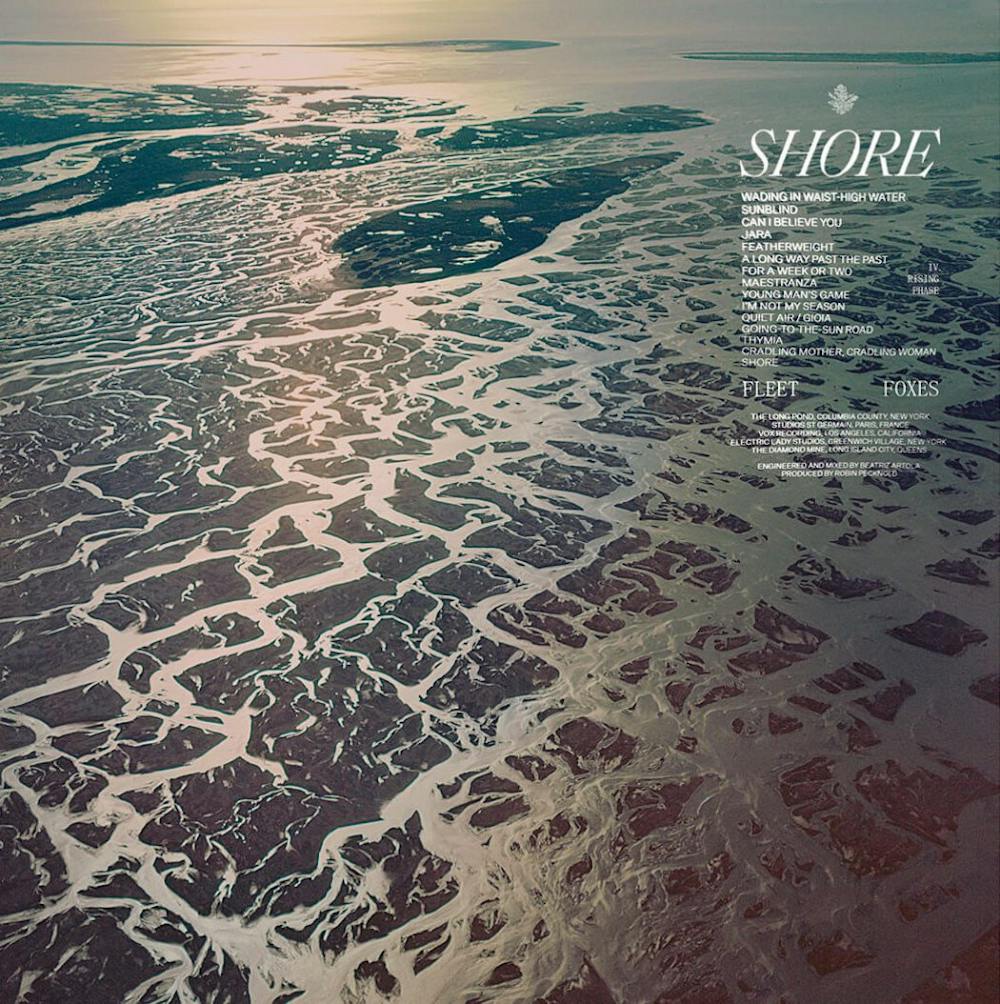by Fluffy Cat // Alumni DJ
A common theme I've seen in albums from 2020 has been escapism. From Bruce Springsteen’s Letter to You and Phoebe Bridgers’ Punisher, artists have been using their art as a means of salvation from the realities of the world. Even if these albums started before the current world situation, as Shore did, they have either retroactively gotten the specter of the pandemic placed upon them, or their direction is impacted by it.

The pandemic has gifted these artists a rare opportunity to slow down and collect their thoughts amidst a collection of tour date cancellations and changed plans. Music has allowed them to escape their pains and transcend them, to form them into a comprehensible and conciliable whole.
Fleet Foxes’ Shore, an album from a band known for high-quality indie folk (and most known here at the station for their brief association with Father John Misty), takes this one step further by building their entire sound around a place of escape. Through repeated listens of the album, I have found myself noting this ‘beach atmosphere’ that the album creates.
Almost every single track sounds like the band crafted Shore with thoughts of the beach on their brains. It's an album to get lost in. The vocal dubbing, which becomes increasingly apparent on the chorus of many tracks, adds this echo that gives me the feel of a performance on a secret cove, surrounded by a cliff face that carries the echo. Even on higher tempo tracks like “A Long Way Past the Past” and “Can I Believe You,” two of the album’s most accessible works, it feels like Pecknold getting lost in the work he has created. I also get a feeling that those songs are one of the biggest manifestations of escape on the album; Shore is more directly meditative, dwelling on concrete ideas and looking for a day under the sun where a meditative bliss could be found. It dances on the edge between emotions of grief and happiness, between recollection and moving forward.
In that sense, I don’t think the album is best served listening to single tracks. There are obvious highlights, but I think this album gets the best treatment by listening to it as a whole, or, at very least, in parts. For example, I think that the first five songs encapsulate a little set in and of itself, and then the second five, and then the third five.
The first set revolves around “Sunblind and “Can I Believe You,” but also includes “Featherweight,” all of which I say are some of my favorites on the whole album. The second part centers on “Maestranza” and “Young Man’s Game,” even though “A Long Way Past the Past” is also a highlight. The final set floats around “Cradling Mother, Cradling Woman” and “Shore,” bringing the album to a loving close.
I think that “Featherweight” and “Sunblind” are two of the songs I would recommend in this album. “Featherweight” is a melodic and downbeat meditation on the world, punching through the chorus with chant-like, echoing vocals. It is downright enchanting, finding itself floating over top of delicate strumming and floating down a slow-moving river of sound.
“Sunblind” serves as an upbeat island in a work that naturally tends towards a sound evocative of a melancholy mood. “Sunblind” is probably my album highlight, being Pecknold’s track to tackle the loss of inspirations and friends in his life. He leads with “For Richard Swift / For John and Bill / For every gift lifted far before its will,” a haunting lyric that reminds us of the musicians and artists who have passed away in recent years. Richard Swift is a famed producer, who worked with Fleet in the past Foxes and others such as Nathaniel Rateliff & The Night Sweats, helping to produce the latter's self-titled album.
The singer names several famous musicians that have passed away in this contemplative wail of a light rocker. These names are left framed in a narrative of escapism that overtakes him in the chorus, carried along in a metaphorical backpack as he goes swimming in some forgotten cove.

One final track I wanted to bring up is not the big hit, “Can I Believe You,” as strong as it is for an introductory taste to Fleet Foxes’ work on indie stations. I would like to focus, instead, on “Cradling Mother, Cradling Woman.” The brass section in this album serves as an undertone underneath much of the album, adding energy to these beach-y tunes. This track lets them into the overtones, creating this rich sound that blends into the drums which serve more than just a pace-setting role here.
Interestingly, the track starts with a demo take of Brian Wilson, the lyric master of the Beach Boys, who Pecknold cites as deeply influential in his work. It makes complete sense here, as even when the brass is going on at full force, it feels like a natural progression on the sound that Wilson and his band had in Pet Sounds. It is the longest track on the album, and Pecknold & co. give it the time that it needs to expand to its full glory before letting it fade out with a sort of amplifier growl.
Shore is an album that sounds quite pretty on its first listen, but it is an album that is best served with multiple tracks listened to in rapid succession, if not from front-to-back. It is a journey that needs to be experienced, at least in sections, for its full beauty to be appreciated. I also think that some songs, like the latter two discussed, require multiple listens to get everything out of them. I think it ages well over time, and it is something to return to for repeated listens.
A couple of the tracks might fit into my regular rotation of songs for the time being, but I still stress that the work is best consumed as a whole. Its reflection in a time of worldwide crisis has been a refreshing take, which I think is warranted, given their time in the music space and the time that passes Pecknold by. I highly recommend this work, and I will be looking out for more from the band in the future.
Check out Fleet Foxes' album Shore!

